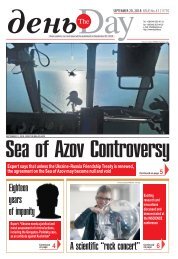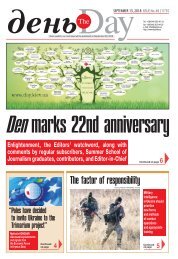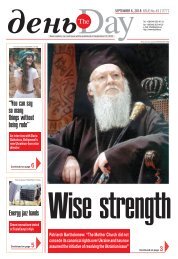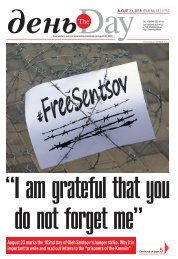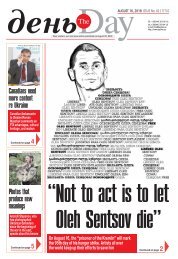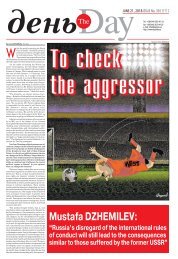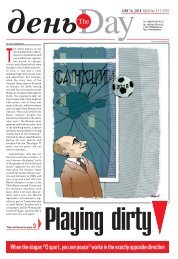36_ENG
Create successful ePaper yourself
Turn your PDF publications into a flip-book with our unique Google optimized e-Paper software.
WWW.DAY.KIEV.UA<br />
TOPIC OF THE DAY No.<strong>36</strong> JUNE 12, 2018 5<br />
Who outplayed whom?<br />
Lawyer: “Although the law on the Anticorruption Court<br />
has been passed, the leadership got the upper hand”<br />
By Ivan KAPSAMUN,<br />
photos by Ruslan KANIUKA, The Day<br />
Let us recall how many calls<br />
there have been in the past<br />
few years to establish the<br />
Anticorruption Court.<br />
Many. But, to start with, it<br />
was, of course, necessary to pass<br />
a law to this effect. This brought<br />
about a long standoff. On one<br />
side, it is the leadership which<br />
proposed its bill and wanted to<br />
form the Anticorruption Court in<br />
accordance with its rules; on the<br />
other, it is a part of the Ukrainian<br />
public, international partners,<br />
and representatives of the<br />
democratic opposition. There is<br />
also a third side – those who<br />
oppose the establishment of this<br />
court on the grounds that this<br />
will in any case boil down to<br />
window dressing in the current<br />
conditions and it is better to<br />
reform the existing courts so they<br />
could try corruptionists. But, as<br />
the law was finally passed, let us<br />
focus on it.<br />
After a long standoff, MPs<br />
cast 315 votes for establishing<br />
the High Anticorruption Court<br />
(constitutional majority). But,<br />
before doing so, they had examined<br />
1,927 amendments to the<br />
law. This vividly illustrates the<br />
quality of the document submitted<br />
by the Presidential Administration.<br />
One of the main points MPs<br />
failed to come to terms about for<br />
a long time was powers of the<br />
Nongovernmental Board of International<br />
Experts. The question<br />
was whether or not international<br />
partners will be authorized to debar<br />
from competition the candidates<br />
that raise their doubts. Parliament<br />
Speaker Andrii PARU-<br />
BII said “a formula we found”<br />
fully complies with recommendations<br />
of the Venice Commission.<br />
The Chairman of the Parliamentary<br />
Committee on Legal Policies<br />
and Justice, Ruslan Kniazevych,<br />
explained the law’s most<br />
controversial clause on the selection<br />
of Anticorruption Court<br />
judges as follows: “The Nongovernmental<br />
Board consists of<br />
six members appointed by the High<br />
Qualification Commission of<br />
Judges (VKKS) exclusively on the<br />
basis of proposals from international<br />
organizations with which<br />
Ukraine cooperates in the field of<br />
preventing and countering corruption<br />
in accordance with international<br />
agreements. On the initiative<br />
of at least three members of<br />
the Nongovernmental Board of International<br />
Experts, the question<br />
of whether a candidate for the office<br />
of a High Anticorruption<br />
Court judge meets the necessary<br />
criteria is to be discussed at a joint<br />
meeting of the VKKS and the Nongovernmental<br />
Board of International<br />
Experts. The decision on<br />
whether this candidate meets these<br />
criteria is to be made by the majority<br />
of VKKS and Nongovernmental<br />
Board members on condition<br />
that at least a half of Nongovernmental<br />
Board members have<br />
voted for it. Should this decision<br />
not be made, the candidate shall be<br />
considered as rejected.” (unian.us)<br />
The Anticorruption Court is<br />
to be formed within 12 months<br />
from the day this law came into<br />
force.<br />
President Petro Poroshenko,<br />
the bill’s initiator, who was present<br />
in the session hall during the<br />
vote, called on MPs to muster<br />
their strength and approve this<br />
document. After the vote, the<br />
head of state repeatedly pronounced<br />
the word “victory” in his<br />
traditional manner: “It is a victory,<br />
a victory of Ukraine, a victory<br />
of the Ukrainian people, the<br />
victory of me as president of<br />
Ukraine, a victory of the Ukrainian<br />
parliament with Speaker Andrii<br />
Parubii at the head, a victory<br />
of the Ukrainian government with<br />
Prime Minister Volodymyr Hroisman<br />
at the head.”<br />
With due account of a long<br />
history and all the peripeteia, the<br />
“victory” looks at least indecent in<br />
this case. Too much pomp and anguish<br />
in the conditions, when the<br />
state needs a strong remedy and<br />
radical surgery, rather than<br />
shamans or antipyretic pills. It<br />
will be recalled that the law on the<br />
State Bureau of Investigations<br />
was passed as long as two and a<br />
half years ago, but this body has<br />
not yet been formed. The country<br />
has long needed serious reforms,<br />
all the more so that war is still going<br />
on at our territory. Instead, we<br />
can the ante endlessly upped in the<br />
inter-clannish struggle, protection<br />
of personal interests, in playing<br />
down to society, and in promises<br />
to international partners.<br />
All right, let us put aside criticism<br />
for a while and accept the<br />
logic of those who say that passing<br />
the law on the Anticorruption<br />
Court in the present conditions is<br />
at least a kind of a step. What does<br />
it mean? “It seems at first glance<br />
that compromises were reached<br />
and satisfy the Venice Commission<br />
and the IMF,” lawyer Ruslan RI-<br />
ABOSHAPKA comments to The<br />
Day. “In all probability, the leadership<br />
will be delaying the implementation<br />
of this law. On the<br />
whole, I do not think this court is<br />
a panacea and will solve the problem<br />
of corruption.”<br />
“What simply stuns me is<br />
weakness and non-professionalism<br />
of our experts and civic activists<br />
because they have shown a<br />
children’s level,” lawyer Vitalii<br />
TYTYCH told The Day. “In the<br />
past three months, I’ve been in<br />
contact with all stakeholders,<br />
Ukrainian activists, the US ambassador<br />
to Ukraine, and the head<br />
of the IMF mission, but, as a result,<br />
I failed to see that we have<br />
outplayed the current leadership.<br />
In reality, the latter, including<br />
President Poroshenko; Filatov,<br />
in charge of legal affairs in the<br />
Presidential Administration; Kniazevych<br />
in parliament; and Koziakov,<br />
chairman of the High Qualification<br />
Commission of Judges,<br />
have outplayed everybody. The<br />
vast majority of amendments<br />
were aimed at blocking the passage<br />
of the law and creating<br />
chaos. All these amendments are<br />
not the first victory of Bankova<br />
St. And when it is said that the<br />
establishment of this court is a<br />
step forward, I disagree. It is not<br />
clear how six members of the Nongovernmental<br />
Board will be able<br />
to prove that a certain individual<br />
is not competent enough. And<br />
who will they be vetoing? To be<br />
able to choose somebody, one must<br />
have a choice, and there will only<br />
be a choice if professionals and<br />
honest people, who can sacrifice<br />
themselves (such is the work in a<br />
true anticorruption court), accept<br />
offer to work there. But normal<br />
people are unlikely to go there<br />
because no conditions have been<br />
created. Maybe, our Western<br />
partners’ plans included a strategy<br />
– to force us to pass this law<br />
for the time being, leaving the<br />
VKKS free to apply its methods<br />
afterwards.”




